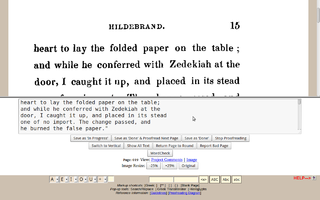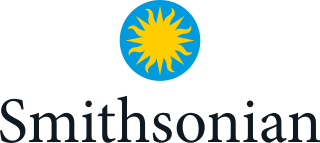
Distributed Proofreaders is a web-based project that supports the development of e-texts for Project Gutenberg by allowing many people to work together in proofreading drafts of e-texts for errors. As of July 2024, the site had digitized 48,000 titles.

Library and Archives Canada is the federal institution tasked with acquiring, preserving, and providing accessibility to the documentary heritage of Canada. The national archive and library is the 16th largest library in the world. The LAC reports to the Parliament of Canada through the Minister of Canadian Heritage.

A chapbook is a type of small printed booklet that was a popular medium for street literature throughout early modern Europe. Chapbooks were usually produced cheaply, illustrated with crude woodcuts and printed on a single sheet folded into 8, 12, 16, or 24 pages, sometimes bound with a saddle stitch. Printers provided chapbooks on credit to chapmen, who sold them both from door to door and at markets and fairs, then paying for the stock they sold. The tradition of chapbooks emerged during the 16th century as printed books were becoming affordable, with the medium ultimately reaching its height of popularity during the 17th and 18th centuries. Various ephemera and popular or folk literature were published as chapbooks, such as almanacs, children's literature, folklore, ballads, nursery rhymes, pamphlets, poetry, and political and religious tracts. The term chapbook remains in use by publishers to refer to short, inexpensive booklets.

The International Research Center for Japanese Studies, or Nichibunken (日文研), is an inter-university research institute in Kyoto. Along with the National Institute of Japanese Literature, the National Museum of Japanese History, and the National Museum of Ethnology, it is one of the National Institutes for the Humanities. The center is devoted to research related to Japanese culture.

The University of Michigan Library is the academic library system of the University of Michigan. The university's 38 constituent and affiliated libraries together make it the second largest research library by number of volumes in the United States.

The German National Library is the central archival library and national bibliographic centre for the Federal Republic of Germany. It is one of the largest libraries in the world. Its task is to collect, permanently archive, comprehensively document and record bibliographically all German and German-language publications since 1913, foreign publications about Germany, translations of German works, and the works of German-speaking emigrants published abroad between 1933 and 1945, and to make them available to the public. The DNB is also responsible for the Deutsche Nationalbibliografie and several special collections like the Deutsches Exilarchiv 1933–1945, Anne-Frank-Shoah-Bibliothek and the Deutsches Buch- und Schriftmuseum. The German National Library maintains co-operative external relations on a national and international level. For example, it is the leading partner in developing and maintaining bibliographic rules and standards in Germany and plays a significant role in the development of international library standards. The cooperation with publishers has been regulated by law since 1935 for the Deutsche Bücherei Leipzig and since 1969 for the Deutsche Bibliothek Frankfurt am Main.
The Library of Congress Subject Headings (LCSH) comprise a thesaurus of subject headings, maintained by the United States Library of Congress, for use in bibliographic records. LC Subject Headings are an integral part of bibliographic control, which is the function by which libraries collect, organize, and disseminate documents. It was first published in 1898, a year after the publication of Library of Congress Classification (1897). The last print edition was published in 2016. Access to the continuously revised vocabulary is now available via subscription and free services.

In library and information science, cataloging (US) or cataloguing (UK) is the process of creating metadata representing information resources, such as books, sound recordings, moving images, etc. Cataloging provides information such as author's names, titles, and subject terms that describe resources, typically through the creation of bibliographic records. The records serve as surrogates for the stored information resources. Since the 1970s these metadata are in machine-readable form and are indexed by information retrieval tools, such as bibliographic databases or search engines. While typically the cataloging process results in the production of library catalogs, it also produces other types of discovery tools for documents and collections.
The Jewish Public Library or JPL is a public library in Montreal, Quebec, Canada, founded in 1914. The library contains the largest circulating collection of Judaica in North America. The JPL has close to 4000 members, and receives 700 to 800 visitors weekly. A constituent agency of Federation CJA, the Jewish Public Library is independent of the Montreal Public Libraries Network and instead receives its funding from the city's Jewish community, membership fees, donations and endowments.

Michigan State University Libraries is the academic library system of Michigan State University in East Lansing, Michigan, United States. The library system comprises nine branch locations including the Main Library. As of 2021-22, the MSU Libraries ranked 26th among U.S. and Canadian research libraries by number of volumes and 7th among U.S. and Canadian research libraries by number of titles held.

Trade literature is a general term including advertising, customer technical communications, and catalogues.

The Library of Congress (LOC) is a research library in Washington, D.C., serving as the library and research service for the United States Congress and the de facto national library of the United States. It also administers copyright law through the United States Copyright Office.

Smithsonian Libraries and Archives is an institutional archives and library system comprising 21 branch libraries serving the various Smithsonian Institution museums and research centers. The Libraries and Archives serve Smithsonian Institution staff as well as the scholarly community and general public with information and reference support. Its collections number nearly 3 million volumes including 50,000 rare books and manuscripts.

McGill University Library is the library system of McGill University in Montréal, Québec, Canada. It comprises 13 branch libraries, located on the downtown Montreal and Macdonald campuses, holding over 11.78 million items. It is the fourth-largest research intensive academic library in Canada.
-ana is a suffix of Latin origin that is used in English to convert nouns, usually proper names into mass nouns, most commonly in order to refer to a collection of things, facts, stories, memorabilia, and anything else, that relate to a specific place, period, person, etc.
The University of Manitoba Press (UMP) is an academic publishing house based at the University of Manitoba in Winnipeg. Founded in 1967, the UMP is the first university press in western Canada.
Canadiana.ca, formerly the Canadian Institute for Historical Microreproductions, is a non-profit dedicated to preserving Canada's heritage and making it accessible online.

The X̱wi7x̱wa LibraryIPA:[χʷiʔχʷa] is an Indigenous library at the Vancouver campus of the University of British Columbia. The library, which draws its name from the Squamish word for echo, was named by Chief Simon Baker of the Squamish Nation. The library is notable for its approaches to organizing First Nations knowledge and major collections and holdings in a way that expresses Indigenous thought and culture. Holding some 15,000 items, it is fully integrated with the main library of UBC.

Bruce Peel Special Collections is a library in the University of Alberta Library system that includes more than 100,000 rare books and archival materials. The library is named for Bruce Braden Peel, chief librarian at the University of Alberta from 1955 to 1982.















